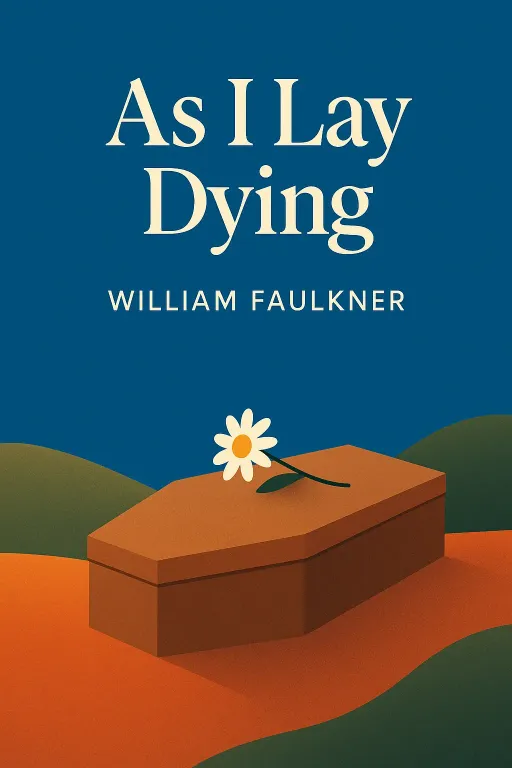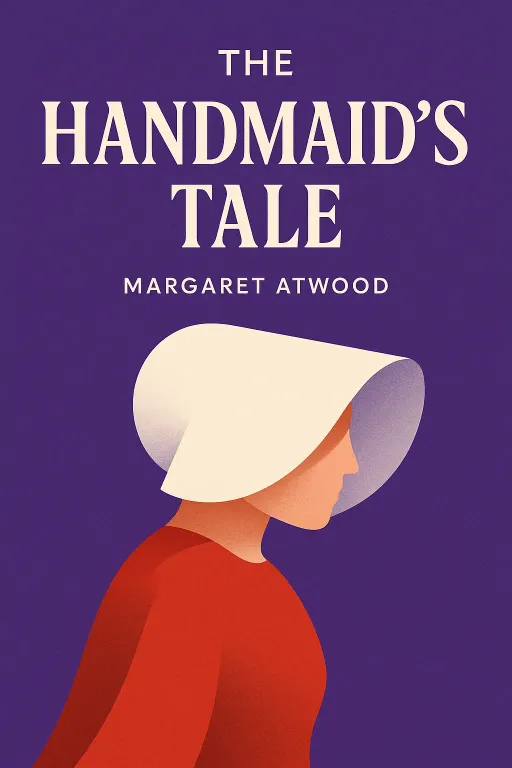
As I Lay Dying
9 minIntroduction
Narrator: Imagine the sound of a saw, the rhythmic scrape of a plane on wood. Now, imagine that sound is the soundtrack to a mother's last hours on earth. It is the sound of her own son, Cash, building her coffin right outside her window, a constant, audible reminder of her impending death. This is the haunting opening to the world of the Bundren family, a poor, rural Mississippi clan bound by a single, grim promise. Their journey, born from this promise, will become a tragicomic odyssey through flood, fire, and the darkest corners of the human heart. This harrowing quest is the subject of William Faulkner’s modernist masterpiece, As I Lay Dying, a novel that dissects the concepts of duty, love, and sanity through a chorus of broken voices.
The Unyielding, Absurd Promise
Key Insight 1
Narrator: The entire narrative is set in motion by a single, powerful obligation: Addie Bundren’s dying wish to be buried with her family in her hometown of Jefferson, some forty miles away. For her husband, Anse, this is not a request but a sacred vow. He repeats his justification like a mantra to anyone who will listen: "I give her my promise." This promise becomes the family's unassailable reason for undertaking a journey that defies all logic and compassion. They face a washed-out bridge, a dangerously rising river, and the scorn of their neighbors, yet they press on. This determination, however, is less a noble tribute and more a display of stubborn, almost foolish, pride. Anse insists on using their own wagon, proclaiming that Addie "was ever a private woman," but this decision, like many others, serves his own sense of propriety more than it honors his late wife. The journey to fulfill Addie's wish becomes a testament to the power of obligation, revealing the absurd and often cruel lengths people will go to in the name of duty.
The Collision of Self-Interest and Grief
Key Insight 2
Narrator: While the journey to Jefferson is framed as an act of familial loyalty, it quickly reveals itself to be a convenient vehicle for each character's secret, selfish desires. The trip is not just for Addie; it is for them. The patriarch, Anse, is perhaps the most transparent. His first thought upon Addie's death is not of his loss, but of his gain: "Now I can get them teeth." The entire arduous trek is, for him, a means to an end—a new set of false teeth he has long coveted.
This theme of self-interest culminates in a moment of profound betrayal. To acquire a new team of mules after their old ones drown, Anse secretly trades away his son Jewel's most prized possession: his horse. Jewel, a character defined by his fierce, almost violent love for his mother and his horse, is devastated. Anse’s deception for the sake of his own convenience—and the money for his teeth—shatters the family's fragile unity. Similarly, the daughter, Dewey Dell, is not focused on her mother's burial but on her own desperate situation. Pregnant and unmarried, she sees the trip to Jefferson as her only chance to find a drugstore and obtain an abortion, a secret quest that isolates her in her own private grief and fear. The journey, therefore, is not a shared experience of mourning but a collection of individual, competing agendas, all cloaked under the guise of honoring Addie.
The Decay of Body and Bond
Key Insight 3
Narrator: As the Bundrens' journey stretches on, the physical decay of Addie's body in the sweltering Mississippi heat becomes a powerful symbol for the moral and psychological disintegration of the family itself. The stench from the coffin grows, attracting buzzards and repulsing the townsfolk they encounter. This physical corruption mirrors the breakdown of their familial bonds and societal norms.
The most grotesque illustration of this is the treatment of Cash, the carpenter son. During a disastrous river crossing, the wagon overturns, and Cash's leg is badly broken. Instead of seeking proper medical care, the family, ever-focused on their mission, devises a horrific home remedy. They encase his broken leg in a makeshift cast of cement. This act of misguided practicality causes Cash immense suffering, his leg turning black from the lack of circulation. They prioritize the transportation of a corpse over the well-being of a living son, laying him on top of the coffin as they jolt along the road. This moment captures the family's complete loss of perspective, where the abstract duty to the dead has completely eclipsed their compassion for the living. The family's moral compass, like Addie's body, is rotting away on the road to Jefferson.
The Failure of Words
Key Insight 4
Narrator: In a stunning chapter narrated from beyond the grave, Addie Bundren herself provides the philosophical key to the novel's chaos. She reflects on her life as a schoolteacher and her profound disillusionment with language. For Addie, words are hollow things, "just a shape to fill a lack." She believes that concepts like "love" and "fear" are just words invented by people who have never truly experienced the raw, violent reality of the feelings themselves. Her father had a saying that shaped her worldview: "the reason for living was to get ready to stay dead."
This belief in the inadequacy of words explains the deep communication failure within the Bundren family. They talk at and past one another, but they rarely connect. Darl, the most articulate son, uses words to taunt and expose others, while Cash expresses himself through the precise, tangible action of his carpentry. Anse uses platitudes to justify his selfishness. Because words have failed them, their actions become their only true form of expression, and those actions are often violent, misguided, or cruel. The novel's stream-of-consciousness style, jumping between fifteen different narrators, is Faulkner's way of showing that truth is not a single, objective fact but a fractured collection of personal, incommunicable experiences.
A Child's Grasp of Death
Key Insight 5
Narrator: The psychological trauma of this grim journey is seen most clearly through the eyes of the youngest son, Vardaman. Unable to comprehend the abstract concept of his mother's death, his mind scrambles for a tangible metaphor. Just before his mother died, Vardaman caught a large fish, which he proudly brought home, cleaned, and chopped into pieces for supper. In his confused, grieving mind, the two events become one. He concludes, in one of the novel's most famous lines, "My mother is a fish."
This isn't just a child's strange fantasy; it's a profound psychological coping mechanism. The fish was alive, and then it was not. It was whole, and then it was cut apart. By equating his mother with the fish, Vardaman attempts to process an event that is too immense for him to understand. His grief also turns to rage. Blaming the doctor, Peabody, for failing to save his mother, Vardaman bores holes into her coffin lid so she can breathe, an act of love that violates the very vessel Cash so carefully built. Vardaman’s perspective provides a heartbreaking look at the collateral damage of the family's dysfunction, showing a child left utterly alone to navigate the terrifying landscape of loss.
Conclusion
Narrator: Ultimately, As I Lay Dying is a dark comedy about the gap between intention and action, between the noble duties we claim to uphold and the selfish desires that truly drive us. The Bundrens' quest to honor Addie's final wish becomes a catalog of human folly, pride, and desperation. Faulkner masterfully reveals that the most profound journeys are not across landscapes, but through the internal, often treacherous, terrain of the self.
The novel challenges us to look past the simple words we use for complex emotions like "family," "love," and "duty." It asks a difficult question: When our actions in the name of honoring the dead bring nothing but suffering to the living, what is the true meaning of our loyalty?









